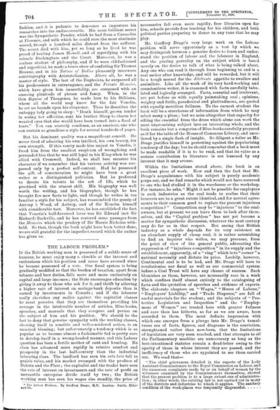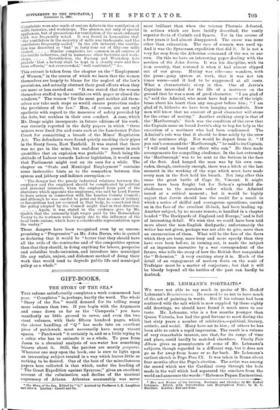THE LABOUR PROBLEM.* Ir the British working man is possessed
of a subtle sense of humour, he must enjoy many a chuckle at the interest and enthusiasm which his position and cause have aroused since he became possessed of a vote. Our fiscal system is being gradually modified so that the burden of taxation, apart from tobacco and beer duties, falls more and more exclusively on capital and large incomes ; the State encourages education by giving it away to those who ask for it, and thrift by allowing a higher rate of interest on savings-bank deposits than is earned by investments in Consols ; and if the labourer really cherishes any malice against the capitalist classes he must perceive that they are themselves providing his revenge in the intolerable number of articles, Blue-books, speeches, and manuals that they compose and peruse on the subject of him and his position. We should be the last to deny that genuine sympathy with the working classes, showing itself in sensible and well-considered action, is an unmixed blessing; but unfortunately a tendency which is so popular as to become almost a fashionable fad is pretty sure to develop itself in a wrong-headed manner, and this Labour question has been a fertile mother of cant and humbug. No class has advanced more rapidly in relative comfort and prosperity in the last half-century than the industrial labouring class. The landlord has seen his sate l.vta fall to prairie value, and his market swamped with the produce of Dakota and the Plate ; the capitalist and the trader have seen the rate of interest on investments and the rate of profit on mercantile enterprise divide itself by two ; the British working man has seen his wages rise steadily, the price of
• The Labour Problem. By Geoffrey Drage, M.P. London: Smith, Elder, and 00.
necessaries fall even more rapidly, free libraries open for him, schools provide free teaching for his children, and both political parties preparing to dance to any tune that he may play.
Mr. Geoffrey Drage's very large work on the Labour problem will serve opportunely as a test by which we may distinguish between a genuine desire to learn and under- stand the position of labour and the labourer in England, and the prating garrulity on the subject which is based merely on the desire to talk of what is being talked about.
Any one who can read it through from beginning to end is a real seeker after knowledge, and will be rewarded, but it will be a tough morsel for the dilettante appetite to swallow and assimilate. Like all the work of its very hard-working and conscientious writer, it is crammed with facts carefully tabu- lated and logically arranged. Facts, essential and irrelevant, are put before us with equally painstaking zeal ; opinions, weighty and futile, paradoxical and platitudinous, are quoted with equally merciless fullness. To the earnest student the book will be a storehouse of information from which he may select many a plum ; but we miss altogether that capacity for sifting the essential from the dross which alone can work the most unpromising subject into an interesting whole, and the book remains but a congeries of Blue-books carefully prepared as if for the table of the House of Commons Library, and unre- lieved by a single flash of insight. So diligent a toiler as Mr.
Drage justifies himself in protesting against the popularising tendency of the day; but he should remember that a book must be made readable if it is to be read, and that its value as a serious contribution to literature is not lessened by any interest that it may arouse.
Within the limitations stated above, the book is an excellent piece of work. Now and then the fact that Mr.
Drage's acquaintance with his subject is purely academic peeps out, and we find remarks which would not have occurred to one who had studied it in the warehouse or the workshop. For instance, he asks, " Might it not be possible for employers in such industries as the coal trade to realise that their interests are to a great extent identical, and for mutual agree. ments to their common good to replace the present injurious competition ? " Competition may be "injurious " to the coal- owners, but at present we can leave them to look after them- selves, and the " Capital problem " has not yet become a matter for sympathetic discussion, whatever the next century may do for us in that respect. But seeing that British industry as a whole depends for its very existence on an abundant supply of cheap coal, it is rather astonishing to find an inquirer who writes, we may presume, from the point of view of the general public, advocating the suppression of "injurious competition" in its supply and the establishment, apparently, of a " ring " which is to " corner " a national necessity and dictate its price. Luckily, however, Continental coal is to be had, and Mr. Drage will have to revolutionise our fiscal as well as our commercial system before a Coal Trust will have any chance of success. Such blemishes as these, however, are necessarily rare in a work which confines itself almost entirely to the cataloguing of facts and the quotation of speeches and evidence of experts. The elaborate chapters on " Wages," "Hours of Labour," "Employers' Liability," and "Trade Disputes," are full of useful materials for the student; and the subjects of " Pro- tective Legislation and Inspection" and the "Employ- ment of Women" are treated here with greater fellness and care than has hitherto, as far as we are aware, been accorded to them. The most definite impression with which one emerges from a plunge into Mr. Drage's tumul- tuous sea of facts, figures, and diagrams is the conviction, strengthened rather than new-born, that the limitations of legislation are very soon reached, and that attempts to oil the Parliamentary machine are unnecessary as long as the best-intentioned statutes remain a dead-letter owing to the apathy of those in whose interest they are passed, and the inefficiency of those who are appointed to see them carried out. We read that-
" The chief grievances detailed in the reports of the Lady Assistant-Commissioners to the Royal Commission on Labour, and the numerous complaints made by or on behalf of women by the witnesses examined by the Commissioners themselves, showed that the present problem is to a large extent one of administra- tion ; in other words, the existing law is not carried out in many of the districts and industries to which it applies. The sanitary
condition of the work-places was frequently disgraoeful.
Complaints were also made of serious defects in the ventilation of mills, factories, and workshops. The absence, not only of special appliances, but of precautions for ventilation of the most ordinary kind, was frequently noted. It was found in Lancashire that the ventilation in the majority of mills was inadequate, and the ventilators frequently sealed.' In the silk industry, the ventila- tion was described as bad' in forty.four out of fifty-one mills visited Similar complaints are common in all centres of the textile industries, and in numerous other factories and work- shops Nevertheless, the Factory and Workshop Acts provide ' that a factory shall be kept in a cleanly state and free from effluvia," not overcrowded,' well ventilated,' " ctc.
This extract is taken from the chapter on the "Employment of Women," in the course of which we learn that the women themselves are largely to blame for the neglect of the law's provisions, and actually obstruct their good effects when they are more or less carried out. " It was stated that the women themselves stuffed up the ventilators with paper or closed the windows." The women "for the most part neither aid them- selves nor take such steps as would ensure protection under the provisions of the law." Men, of course, are not only apathetic with regard to the measures of safety provided by the Acts, but reckless in their own conduct. A case, which Mr. Drage might incorporate in future editions of his work, was recently reported in the daily papers in which " three miners were fined 20s. and costs each at the Lanchester Police Court for committing a breach of the Mines' Regulation Act. The defendants were found quietly smoking their pipes in the Busty Seam, East Tanfield. It was stated that there was no gas in the mine, but coal-dust was present in such quantities that an explosion was probable." Such being the attitude of Labour towards Labour legislation, it would seem that Parliament might rest on its oars for a while. The chapter on "State and Municipal Employment" contains some instructive hints as to the connection between this system and jobbery and indirect corruption :-
" The danger lest the purely industrial relations between the employer and the employed should be complicated by political and personal interests, when the employed form part of the electorate which appoints the employers, was said by Lord Farrer to have arisen in connection with the London County Council ; and although he was careful to point out that no case of jobbery or favouritism had yet occurred in that body, he considered that the policy adopted by the Council might lead in that direction.
. . . . . Again, it was stated in the evidence give by Mr. Quelch that the unusually high wages paid by the Bermondsey Vestry to its workmen were largely due to the influence of the local trade-unions, which have a considerable representation upon the vestry."
These dangers have been recognised even by so uncom- promising a " Progressive" as Mr. John Burns, who is quoted as declaring that it would be " better that they should have all the evils of the contractor and of the competitive system than that they should, in doing anything for labour, pauperise and subsidise trade-unionism, and introduce into municipal life any unfair, unjust, and dishonest method of doing their work that would tend to degrade public life and municipal policy as a whole."























































 Previous page
Previous page